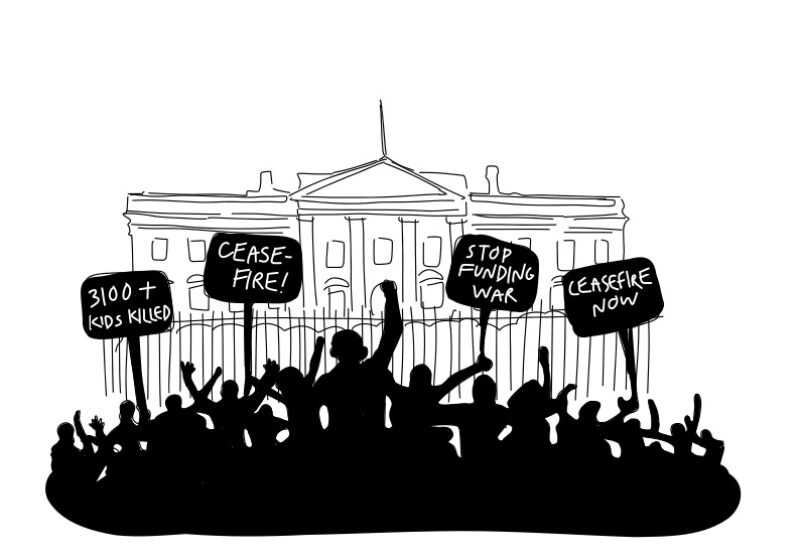It is essential for voters to recognize the significance of the war in Gaza as they weigh their choices for this year’s presidential election. The conflict has profound humanitarian, political, and financial implications. Understanding how each candidate plans to address this crisis is crucial for voters, especially given the deep financial ties to Israel and the broader implications of these actions on international peace and security.
It has been a little over a year since the Oct. 7 attack, and over 1,100 Israelis and 43,000 Palestinians have died from the ongoing war in Gaza, which has now also extended to Lebanon and Syria. These numbers do not include the many undocumented deaths due to reporters being killed on the field.
Though the conflicts occurring in the Middle East seem like a world away from us, this is a very pressing issue that many voters will factor in when casting their ballot for the 2024 presidential election. Kamala Harris (D) and Donald Trump (R) need to secure their standing across Jewish and Muslim American voters, especially in tight battleground states like Michigan and Pennsylvania.
For voters in general, they should care about how each candidate views this issue because it will determine where their tax money will end up. This year, the U.S. gave Israel 8.7 billion dollars in September alone, which included 3.5 billion for essential wartime procurement and 5.2 billion for air defense systems.
In a recent poll by the Pew Research Center, 61% of Americans believe the U.S. should play a diplomatic role in ending the war, while 31% say that Israel has gone too far with their current military operations. What’s more, there are very stark differences in how each party views Israel Prime Minister Netanyahu’s ability to resolve the issue. Almost half of Republicans have confidence in him while 71% of Democrats have little to no confidence in Netanyahu’s handling of the war.
What are each candidate’s views on the conflicts in the Middle East, and how will they be dealing with the issue when becoming president? Harris has repeatedly advocated for the two-state solution, much like her predecessor Joe Biden. She said on the final day of the Democratic National Convention how Israel has the right to self-defense, but that the thousands of lives lost in Palestine is “heartbreaking.” The Biden/Harris presidency has been pushing for a ceasefire since Harris’s meeting with Netanyahu back in July, where she reiterated her unwavering support for Israel but also mentioned that she would not remain silent on the humanitarian crisis in Palestine.
Trump, on the other hand, has been attempting to lure away voters from Harris, confidently claiming that the war would not have started if he would have remained president and that he believes that world affairs will just get worse if Harris takes presidential office. He posted on his social media platform TRUTH Social that “if Kamala gets four more years, the Middle East will spend the next four decades going up in flames, and your kids will be going off to War, maybe even a Third World War.” He also mentioned in an interview with a Saudi-Lebanese news outlet how his business connections in the Middle East will also help him in securing firm ground in Middle East affairs.
In an interview with conservative radio host Hugh Hewitt, Trump mentioned vague plans about having Gaza as a resort “better than Monaco” if “rebuilt the right way.” This is certainly a shocking statement, especially for people who have lost relatives during the war. Other than that, he hasn’t really mentioned a concise foreign policy that his administration would institute if he gains presidency.
Especially due to the war and humanitarian crisis in Gaza, candidates are struggling to gain ground, largely due to the complexity of the situation and its varied effects on different groups of voters. America hasn’t had a great track record when it comes to foreign policy, and one can suggest not being involved altogether.
However, with America’s longtime involvement in providing billions of dollars for weapons that eventually lead to the mass killing and displacement of thousands, it’s crucial for the U.S. to take an active role in ending the conflict. From how deeply they are entangled in this conflict, it is a moral responsibility for the U.S. and the next president to come to a resolution and leverage its power to ensure long-term stability in the region.
However, this should not be the sole determinant for who to cast your vote for this upcoming presidential election. Many people have decided on not voting altogether due to Harris and Trump’s stance on this issue alone. Despite how important it is for how the next president will address the war in Gaza, we have to keep in mind the many pressing domestic policy issues in the nation and how each presidential candidate has expressed their plan on addressing these matters as well. As voters, we have the responsibility to weigh the broader spectrum of policies that will shape the future of our nation.





